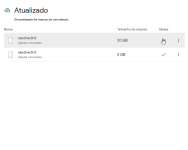fio --name=randrw --ioengine=libaio --direct=1 --sync=1 --rw=randrw --bs=3M --numjobs=1 --iodepth=1 --size=20G --runtime=120 --time_based --rwmixread=75
randrw: (g=0): rw=randrw, bs=(R) 3072KiB-3072KiB, (W) 3072KiB-3072KiB, (T) 3072KiB-3072KiB, ioengine=libaio, iodepth=1
fio-3.33
Starting 1 process
randrw: Laying out IO file (1 file / 20480MiB)
Jobs: 1 (f=1): [m(1)][100.0%][r=51.0MiB/s,w=12.0MiB/s][r=17,w=4 IOPS][eta 00m:00s]
randrw: (groupid=0, jobs=1): err= 0: pid=17888: Wed Jun 25 23:32:10 2025
read: IOPS=13, BW=40.3MiB/s (42.3MB/s)(4836MiB/120012msec)
slat (usec): min=96, max=559, avg=124.43, stdev=25.73
clat (msec): min=39, max=3352, avg=59.77, stdev=138.94
lat (msec): min=39, max=3352, avg=59.89, stdev=138.94
clat percentiles (msec):
| 1.00th=[ 42], 5.00th=[ 44], 10.00th=[ 44], 20.00th=[ 45],
| 30.00th=[ 46], 40.00th=[ 47], 50.00th=[ 47], 60.00th=[ 48],
| 70.00th=[ 50], 80.00th=[ 51], 90.00th=[ 55], 95.00th=[ 59],
| 99.00th=[ 169], 99.50th=[ 793], 99.90th=[ 2265], 99.95th=[ 3339],
| 99.99th=[ 3339]
bw ( KiB/s): min= 6144, max=73728, per=100.00%, avg=46079.65, stdev=12051.62, samples=214
iops : min= 2, max= 24, avg=15.00, stdev= 3.93, samples=214
write: IOPS=4, BW=13.7MiB/s (14.4MB/s)(1650MiB/120012msec); 0 zone resets
slat (usec): min=1642, max=2291, avg=1833.89, stdev=102.56
clat (msec): min=34, max=117, avg=38.54, stdev= 6.01
lat (msec): min=36, max=118, avg=40.37, stdev= 6.00
clat percentiles (msec):
| 1.00th=[ 36], 5.00th=[ 36], 10.00th=[ 36], 20.00th=[ 37],
| 30.00th=[ 37], 40.00th=[ 38], 50.00th=[ 38], 60.00th=[ 39],
| 70.00th=[ 39], 80.00th=[ 40], 90.00th=[ 41], 95.00th=[ 43],
| 99.00th=[ 58], 99.50th=[ 99], 99.90th=[ 117], 99.95th=[ 117],
| 99.99th=[ 117]
bw ( KiB/s): min= 6144, max=43008, per=100.00%, avg=16834.25, stdev=8036.03, samples=200
iops : min= 2, max= 14, avg= 5.47, stdev= 2.61, samples=200
lat (msec) : 50=82.65%, 100=15.63%, 250=1.11%, 500=0.14%, 750=0.05%
lat (msec) : 1000=0.09%, 2000=0.19%, >=2000=0.14%
cpu : usr=0.15%, sys=0.93%, ctx=2177, majf=0, minf=10
IO depths : 1=100.0%, 2=0.0%, 4=0.0%, 8=0.0%, 16=0.0%, 32=0.0%, >=64=0.0%
submit : 0=0.0%, 4=100.0%, 8=0.0%, 16=0.0%, 32=0.0%, 64=0.0%, >=64=0.0%
complete : 0=0.0%, 4=100.0%, 8=0.0%, 16=0.0%, 32=0.0%, 64=0.0%, >=64=0.0%
issued rwts: total=1612,550,0,0 short=0,0,0,0 dropped=0,0,0,0
latency : target=0, window=0, percentile=100.00%, depth=1
Run status group 0 (all jobs):
READ: bw=40.3MiB/s (42.3MB/s), 40.3MiB/s-40.3MiB/s (42.3MB/s-42.3MB/s), io=4836MiB (5071MB), run=120012-120012msec
WRITE: bw=13.7MiB/s (14.4MB/s), 13.7MiB/s-13.7MiB/s (14.4MB/s-14.4MB/s), io=1650MiB (1730MB), run=120012-120012msec
notes:
The google drive uses the local disk like cache.
My drive grow in size, then, slowly down in size after send the file online.
The CPU with google drive was 4 cores. 40% usage.
The traffit on ethernet in 900mbps+, so, was the speed off switch and network card.
The local disk is important be bigger.
Windows 2019 essentials - 1809.
Google one - 30TB.
When restart computer, the shared is lost. You must login again. If use Administrator account, add to the share permissions and use him on credentials to mount on linux. This will free you geting a error permissions message on linux (after mount smb).
Command to mount:
mount -t cifs "//192.168.xxx.xx/g" /mnt/smb/gdrive_backup -o credentials=/etc/smbcredentials/backup.cred,domain=WORKGROUP,iocharset=utf8,vers=3.0,noserverino
Second day of tests.
mount -t cifs "//192.168.xxx.xx/g" /mnt/smb/gdrive_backup -o credentials=/etc/smbcredentials/backup.cred,domain=WORKGROUP,iocharset=utf8,vers=3.11,noserverino
fio --name=randrw --ioengine=libaio --direct=1 --sync=1 --rw=randrw --bs=3M --numjobs=1 --iodepth=1 --size=20G --runtim
e=120 --time_based --rwmixread=75
randrw: (g=0): rw=randrw, bs=(R) 3072KiB-3072KiB, (W) 3072KiB-3072KiB, (T) 3072KiB-3072KiB, ioengine=libaio, iodepth=1
fio-3.33
Starting 1 process
randrw: Laying out IO file (1 file / 20480MiB)
Jobs: 1 (f=1): [m(1)][100.0%][r=27.0MiB/s,w=9225KiB/s][r=9,w=3 IOPS][eta 00m:00s]
randrw: (groupid=0, jobs=1): err= 0: pid=19503: Thu Jun 26 09:35:25 2025
read: IOPS=13, BW=41.6MiB/s (43.6MB/s)(4992MiB/120023msec)
slat (usec): min=93, max=693, avg=132.46, stdev=33.65
clat (msec): min=36, max=2585, avg=57.31, stdev=134.86
lat (msec): min=36, max=2585, avg=57.44, stdev=134.86
clat percentiles (msec):
| 1.00th=[ 37], 5.00th=[ 40], 10.00th=[ 42], 20.00th=[ 43],
| 30.00th=[ 44], 40.00th=[ 45], 50.00th=[ 46], 60.00th=[ 46],
| 70.00th=[ 47], 80.00th=[ 49], 90.00th=[ 52], 95.00th=[ 56],
| 99.00th=[ 211], 99.50th=[ 860], 99.90th=[ 2400], 99.95th=[ 2601],
| 99.99th=[ 2601]
bw ( KiB/s): min= 6144, max=73728, per=100.00%, avg=47853.97, stdev=13825.56, samples=213
iops : min= 2, max= 24, avg=15.58, stdev= 4.50, samples=213
write: IOPS=4, BW=14.1MiB/s (14.8MB/s)(1698MiB/120023msec); 0 zone resets
slat (usec): min=1649, max=3049, avg=1892.63, stdev=160.48
clat (msec): min=34, max=245, avg=38.73, stdev=12.96
lat (msec): min=36, max=247, avg=40.62, stdev=12.95
clat percentiles (msec):
| 1.00th=[ 35], 5.00th=[ 36], 10.00th=[ 36], 20.00th=[ 36],
| 30.00th=[ 36], 40.00th=[ 37], 50.00th=[ 37], 60.00th=[ 39],
| 70.00th=[ 40], 80.00th=[ 40], 90.00th=[ 41], 95.00th=[ 42],
| 99.00th=[ 67], 99.50th=[ 88], 99.90th=[ 247], 99.95th=[ 247],
| 99.99th=[ 247]
bw ( KiB/s): min= 6144, max=43008, per=100.00%, avg=17093.70, stdev=8843.35, samples=202
iops : min= 2, max= 14, avg= 5.56, stdev= 2.88, samples=202
lat (msec) : 50=89.96%, 100=8.74%, 250=0.67%, 500=0.13%, 750=0.04%
lat (msec) : 1000=0.13%, 2000=0.13%, >=2000=0.18%
cpu : usr=0.16%, sys=1.02%, ctx=2245, majf=0, minf=10
IO depths : 1=100.0%, 2=0.0%, 4=0.0%, 8=0.0%, 16=0.0%, 32=0.0%, >=64=0.0%
submit : 0=0.0%, 4=100.0%, 8=0.0%, 16=0.0%, 32=0.0%, 64=0.0%, >=64=0.0%
complete : 0=0.0%, 4=100.0%, 8=0.0%, 16=0.0%, 32=0.0%, 64=0.0%, >=64=0.0%
issued rwts: total=1664,566,0,0 short=0,0,0,0 dropped=0,0,0,0
latency : target=0, window=0, percentile=100.00%, depth=1
Run status group 0 (all jobs):
READ: bw=41.6MiB/s (43.6MB/s), 41.6MiB/s-41.6MiB/s (43.6MB/s-43.6MB/s), io=4992MiB (5234MB), run=120023-120023msec
WRITE: bw=14.1MiB/s (14.8MB/s), 14.1MiB/s-14.1MiB/s (14.8MB/s-14.8MB/s), io=1698MiB (1780MB), run=120023-120023msec
Is a liitle improvement in performance using 3.11 protocol for SMB.
In attach is the explanation about sync.
The google drive uses the local disk like cache, so, if the vm is stored in ssd or nvme you will have best results.
The syncronization is async, so, the files is uploaded after stored on local disk. The ram usage is minimum.
I will now test in PBS, with comparation of the same backups in local storage (ssd) and remote. Tasks like verify, prune and etc.


